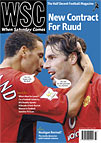 Nowhere is the women’s game more buoyant than in Germany. Margot Dunne reports on the homecoming for the World Cup winners and the hopes for a full-time league
Nowhere is the women’s game more buoyant than in Germany. Margot Dunne reports on the homecoming for the World Cup winners and the hopes for a full-time league
Six months ago, all the average German male knew about women’s football could be written on the back of a beer mat with a blunt bockwurst. But all that was before October 12 last year when Nia Künzer’s golden goal in the final against Sweden shot her country to World Cup glory. The team returned from America and were overwhelmed by the kind of frenzied reception to which their male counterparts grew accustomed in recent decades. The trophy was paraded in front of thousands of screaming fans in Frankfurt; there were chat show appearances for coaches Tina Theune-Meyer and Sylvia Neid; and endless magazine covers featured the new world champions in all their fresh-faced wholesomeness. Journalists voted them “Team of the year” at Germany’s Sports Personality Awards – a title bestowed the previous year on Rudi Völler’s men.
By December, interest had grown to such an extent that TV schedules were changed to allow the women’s European Championship qualifier to be shown live, ahead of the men’s game with France. In bars up and down the land, men proudly watched as the flower of their nation’s womanhood modestly thrashed Portugal 13-0. Striker Birgit Prinz was named FIFA World Player of the Year, and Bend it like Beckham became a box office smash (although, for the German market, bafflingly retitled Kick it like Beckham). For all its new found status, though, women’s football in Germany is still non-professional. Most clubs do attract a certain amount of sponsorship, but nothing approaching the thousands of euros shelled out by companies eager to associate themselves with even the most mediocre men’s sides.
One women’s team near Halle has achieved notoriety by having the name of the local brothel emblazoned across their shirts with the motto “Always worth a visit”. This, say most women players, doesn’t exactly do a great deal to further the carefully cultivated image of female footballers as serious athletes. It was for similar reasons that Prinz reportedly turned down a €1 million (£700,000) move to Italian men’s team Perugia in December, seeing it for what it was – more a publicity stunt than a genuine career opportunity.
Germans are generally reluctant to wave flags or engage in displays of national pride, but to be the most successful football nation in Europe in both the men’s and women’s games must surely give even the most reticent patriot a sneaking sense of satisfaction. The question that potential big-money sponsors are asking, though, is whether the current buzz is merely the intoxication of success or whether the nation has truly discovered the attraction of watching football played in a less aggressive, more tactical way.
It’s definitely the latter according to Monika Staab, coach of 1.FFC Frankfurt, the current Bundesliga champions and winners of the inaugural Women’s UEFA Cup. “We play more technical football. It has become faster and more athletic with fewer fouls. Many men now would rather watch women’s soccer because with the men’s teams every two minutes there is a free-kick. Women are playing with a lot of passion and enthusiasm. In Germany a lot of men are earning a lot of money, but they are not doing enough for their wages.”
She puts the improving standard of women’s play down to the excellent club coaching system. “At a very young age we have very good players. They join a club and train two or three times a week. The quantity of training has increased as well as the quality.” In a move that harks back to the days of East Germany, Frankfurt’s rivals for the women’s Bundesliga title, 1.FFC Turbine Potsdam, have established a live-in sports school and the system has already begun to produce a crop of talented players for the national squad.
It is this kind of slow, steady build-up of a solid infrastructure that will eventually lead to the formation of a sustainable professional league, according to Siegfried Dietrich, the business manager of 1.FFC Frankfurt who is widely credited with having done much to foster a more professional approach to the women’s game.
“The World Cup is a wonderful thing, but let’s not get carried away. If we take things one step at a time and bring everything together steadily – money from sponsors, greater media interest, better stadiums – then we can avoid the problems that caused the collapse of the American women’s league. We are looking at a semi-professional system in three to five years and maybe in five to ten a fully professional league.”
By the time of the next women’s World Cup in 2007, we should know whether women’s football has truly established itself in the German psyche. One day the game might even pass the ultimate test – when groups of school kids gather in playgrounds in Dortmund and Dresden with bundles of dog-eared stickers, asking: “Got swaps of Annike Kahn?”
From WSC 205 March 2004. What was happening this month